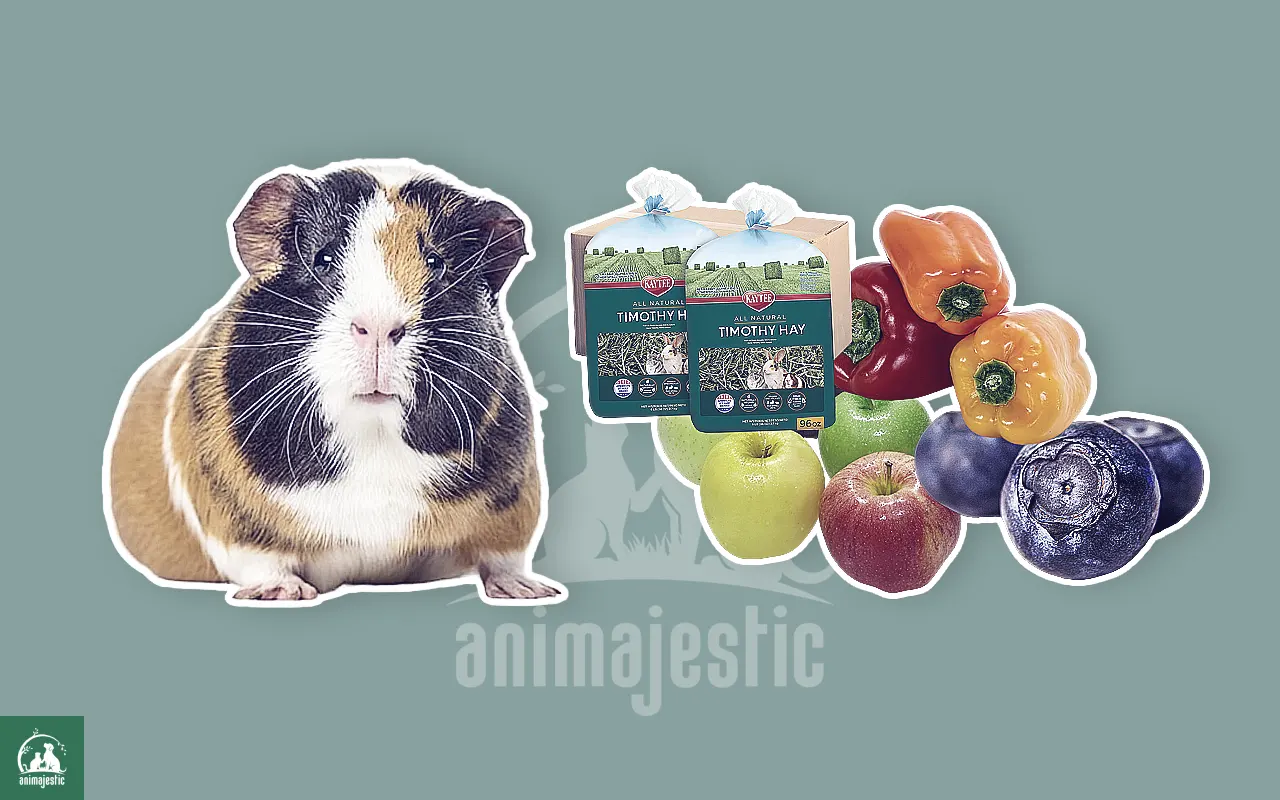When it comes to maintaining a healthy and happy pet, the importance of diet cannot be overstated. For those adored guinea pig owners out there, knowing exactly what to feed these delightful creatures can sometimes pose a confusing challenge.
That’s why we’ve put together this extensive guide on vet-approved foods guinea pigs eat. So, let’s dive into what constitutes an optimal diet for them!
The Guinea Pig Diet Foundation: Hay
One of the golden rules of guinea pig stewardship is that hay should be the backbone of your pet’s diet.
Why Hay?
Guinea pigs, like their rabbit counterparts, are classified as “hindgut fermenters.” This means that in their extensive digestive system, a large organ called the cecum is inhabited by millions of beneficial bacteria that help break down the indigestible fiber from hay.
Consequently, a steady supply of hay not only fills their bellies but is essential for their gastrointestinal health. Furthermore, the constant chewing helps manage their continuously growing teeth, preventing dental issues.
Types of Hay
There are several types of hay suitable for guinea pigs:
- Timothy Hay: This is the most universally recommended type, known for its excellent balance of fiber, protein, and other necessary nutrients.
- Orchard Grass Hay: A softer alternative with a sweet smell, it’s a great option for pets allergic to timothy hay.
- Meadow Hay: This hay offers diversity in taste and texture, stimulating your guinea pigs’ interest in food.
- Oat Hay: An excellent choice once maturity hits, its stems offer more enjoyable crunchiness and its seed heads a delicious treat.
Remember that the hay should always be clean, dry, and free from mold and dust.
Variety with Vegetables
Guinea pigs have a natural requirement for Vitamin C because, much like us humans, they can’t synthesize it themselves. A substantial source of this vitamin can be found in fresh vegetables, which should make up around 15–20% of your pet’s dietary regime.
Vet-Approved Vegetables
The hard part is knowing which veggies to provide. Here are some favorites endorsed by vets:
- Bell Peppers: An excellent source of vitamin C. Avoid the seeds.
- Leafy Greens: Spinach, kale, and fresh parsley are rich in vital nutrients. Caution goes to the high calcite content – feed these sparingly.
- Zucchini & Cucumber: High slabs of water content make these a great hydrating food.
- Carrots: Loved by guinea pigs but high in sugar. Once or twice a week is enough.
Fruits: The Occasional Treat
Humans might love their fruity delights, but for guinea pigs, fruits should be regarded as occasional treats.
Vet-Approved Fruits
While their natural sweetness tends to make them popular amongst these furry little guys, remember that fruit should constitute less than 5% of their overall diet. Some vet-approved fruits include:
- Apples & Pears: Serve in small slices, sans seeds.
- Strawberries & Blueberries: Rich in antioxidants, a great occasional sweet treat.
- Bananas & Kiwis: High in natural sugars, hence very occasional offerings!
Pellets: A Healthy Supplement
While hay should be the dietary staple, guinea pig-specific pellets can provide much-needed additional nutrients.
Choosing the Right Pellets
Quality over quantity reigns supreme when it comes to pellets. Look for timothy hay-based pellets enriched with vitamin C, but avoid ones with added sugars or colorful pieces – these are full of unhealthy filler ingredients. Some well-respected brands include;
- Oxbow Adult Guinea Pig food
- Kaytee Timothy Complete Guinea Pig food
- Science Selective Guinea Pig food
Always Hydrated: Water
Even with access to juicy vegetables, a constant supply of fresh, clean water is vital and must be always available. A sipper bottle is best as it remains uncontaminated by bedding.
Food To Avoid
Not every food is beneficial for a guinea pig. Avoid feeding them iceberg lettuce due to its low nutritional content and potential to cause diarrhea, starchy veggies like potatoes, and processed human foods.
In conclusion, maintaining a healthy diet for your cherished guinea pig takes a little more than just providing a bowl of vegetables: it’s a careful combination of hay, selected veggies, occasional fruit treats, supplemented pellets, and fresh water.
Always consult with your veterinarian about dietary questions or concerns, helping to ensure you’ll be happily squeaking together for many years to come.
